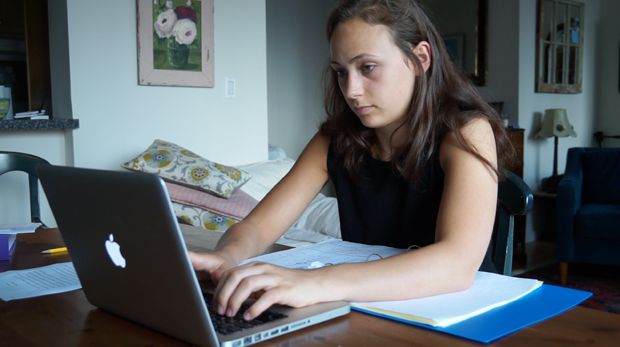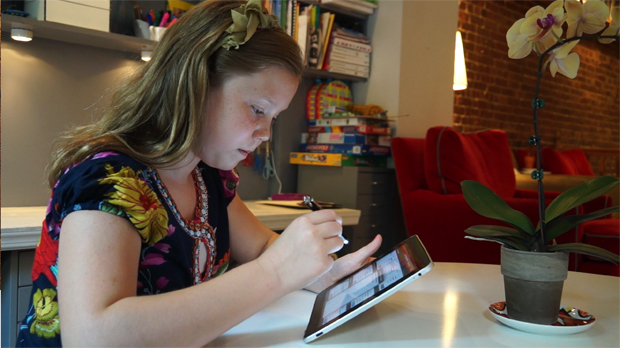What online tutoring programs can do for kids
Like many 6-year-olds, Maria Baker from Yonkers, New York, has trouble with math. "I do struggle sometimes," she said. "Sometimes I don't do it right, sometimes I get it wrong." Her father Ryan, a cognitive scientist who studies digital learning, signed her up for an online tutoring system called Reasoning Mind.
"I've seen major effects from my daughter in her command of math since we started working together at night with Reasoning Mind," Baker said. He said the software helped her develop and improve on specific skills like subtraction. "It's like, magic," Maria said. " It explains stuff to me that I don't know how to do. The math games are really good."
The online tutoring industry is growing, as parents seek more convenient and affordable alternatives to the traditional in-person tutor. Many parents cite the convenience of not having to travel to and from a tutoring center. For kids, there is the extra incentive of using technology to make learning more fun. And proponents of online tutoring argue that it could make education more accessible and democratic for children in disadvantaged areas.
Reasoning Mind offers a monthly subscription plan at $20 or a one-year plan at $200. The software uses games and animated characters, like a genie, to teach children math skills. There's no human interaction involved. Instead, the program adjusts the student's learning path based on which problems they answer right or wrong. "Let's say a kid is struggling with a specific type of problem," said Dr. Baker, "The system can figure that out in real time and give the kid different math problems in real time."
If the child is really struggling, however, a parent or teacher will have to get involved. "Whenever I do something wrong, the sign gets red," said Maria. "The next step is that daddy shows me how to do it."
Baker carried out field research, funded by the Bill and Melinda Gates Foundation, in three Texas schools that used Reasoning Mind. It found 71 percent of students displayed engaged concentration, and they were on-task 82 percent of the time when using the program. Baker said these results show the software can increase a child's educational engagement.
There are similar online tutoring systems available, such as Cognitive Tutor. By providing instant feedback and guidance, the Cognitive Tutor software helps students learn at their own pace both in the classroom and at home.
Of course, the technology does have its limits. "The software by nature can't be as sophisticated as a human being or an expert tutor working one on one with a kid," Baker said.
Parents can hire real, human tutors online for that personal touch. Debbie Debbie Stier from New York City turned to Tutor.com when her daughter needed math help. "I could feel her frustration rising," Debbie said. "It was a very gnarly-looking algebra problem. I wasn't even in the realm of being able to help."
Tutor.com has tutors available 24/7 to help students work through a specific study problem, in any subject ranging from Calculus to English. It works on any device connected to the internet, and at $39.99 per hour, it's a bargain compared to the hourly rates of most in-home tutors.
"You take a picture of your problem and then within a minute I have a tutor there saying 'hey, so I think I see what the problem is,'" Stier's daughter, Daisy Gumin, explained. The tutor and student can then communicate online using an interactive whiteboard and instant messaging. "I drew out (the problem) and we went through it step by step," Daisy said. "It was similar to how it feels when you're face to face with someone."
Daisy said the tutor helped her realize she had "completely forgotten about a step," and she felt as though a lightbulb had gone off. "They didn't just give her the answer, they led her to the answer," her mother said.
Then there's the iPad app Tabtor, which also allows students to interact with a human tutor. The difference is that Tabtor is just for math, and its board-certified instructors tailor a long-term study program for each student. Kari Yates has three kids signed up.
"It's dynamic interaction," said Yates. A child completes worksheets, which are assessed and graded. Tabtor can record every "pen" stroke the child makes, enabling the tutor to see where they went wrong. "Then the next work that comes for the next day is actually adjusted according to where the child grew."
Tabtor's most popular subscription, which costs $60 per month, features a biweekly video conference with the tutor, as well as phone and email support.
Tabtor, like Reasoning Mind, is designed to work in the classroom as well as at home. The company said its pilot program at Greenbrook Elementary School in New Jersey improved students' math test scores by an average of 70 percent.
Yates found that her children enjoyed learning with a tap of a screen. "Where I might prefer a person," she said, "my kids happen to enjoy that it's technology." Her 9-year-old daughter Caroline agrees. "You're doing it on a iPad, and I think personally that that's a little bit more fun than doing it on paper. So it makes it fun to do your math."
A potential downside Yates mentioned was that she doesn't have the accountability of a set appointment each week, as she would with a physical tutor. "So you do have to self-monitor, but the tutors do check in if they haven't seen your child in a while," she said.
In addition to the growing selection of on-demand tutoring services on the internet, there are also free online services like Khan Academy, which provides video tutorials to anyone with an internet connection. The company's founder Salman Khan told 60 Minutes in 2012 that his mission was to provide "a free world-class education for anyone, anywhere."
No online tutoring system is designed to be a full, stand-alone solution. But when paired with parent and teacher assistance, online tutoring could help students - in any location - keep up in the classroom.

